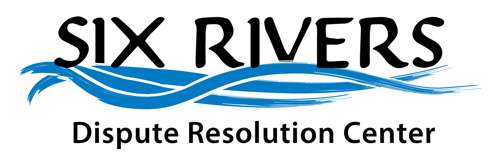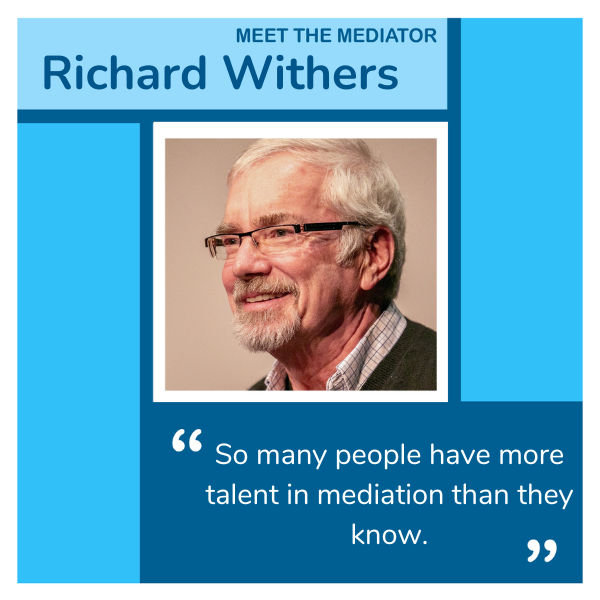We spoke with Six Rivers mediator and board member Richard Withers about mediation and how it connects with his many other interests. Richard is a retired attorney who practiced with concentrations in civil rights, constitutional law, criminal defense and public health in Milwaukee, Wisconsin. A Hood River resident since 2016, he practices both mediation and meditation, volunteers at NORCOR, and is involved in music and community theater.
We started our conversation by asking what three things Richard would like us to know about him. “First off,” he says, “I love to sing, and I recommend it as a great exercise, even if you think you have no voice and no talent. It does wonders for your physical and mental health.” In fact, he says, he met his wife at a sing-along, and they’ve been singing together since then.
“Number two,” he says, “folks should know, much of what I do these days in retirement springs from getting sober. I had a long career of excessive drinking, and about 11 years ago I got sober through a combination of things, especially the strong support of the community and family and friends. So a part of what I do these days is trying to give back–I’m so grateful for the opportunities. I’m grateful for the fact that what I have to do to stay sober, to be productive and to be of service—it makes my life better than it would have been if I had not had a problem with drinking.”
Richard says that getting honest in recovery is what led to learning about honest speaking. He says we practice honesty by telling our stories and then learning how to be honest listeners. “What I mean by honest listening,” he says, “is dropping the stories that we tell ourselves. Dropping the judgments we come to when we hear someone else speak, so that our listening is more honest and more clean. Without the judgments and the prejudices. That is one of the gifts of the recovery process. Not only speaking your truth and sharing it, but listening honestly and being there and listening to someone else.
Thirdly, Richard would like us to know that his Buddhist-influenced meditation and mindfulness practice, “is critically important.” His path into a 12-step program was through a group that used meditation as a practice in recovery. He says, “The meditation angle for me was really important. My background is as son, grandson, and great-grandson of Baptist preachers. Both my uncles went to seminary, and my sister is the pastor of a little Baptist church in Palmer AK. My niece is a minister of a Baptist church in Seattle. It’s in the family—it’s in the genes.” This, he says, led Richard and his wife to seek a mindfulness community when they moved to Hood River.
Richard also worked to bring a mindfulness program to NORCOR inmates, and he still volunteers in the program. “I had some training to do both 12-step and meditation with correctional populations in Milwaukee,” he says, “so I approached the administration at NORCOR, and the timing was right. They had just developed a program for people in recovery from substance abuse and alcohol. I put together a proposal with the peer review research about the effects of mindfulness and meditation practice, and we started a program . . . and they decided to extend it to the entire population.”
Through his work bringing peaceful practices to the Gorge, Richard became more interested in facilitating difficult conversations. An earlier experience in Wisconsin laid the groundwork for his interest in mediation. “I had brought together people over very contentious issues and done a lot of negotiating,” Richard says. “I was part of a project [in Wisconsin] where we did epidemiological research into violent injuries, in particular firearm injuries. I put together a board of state NRA representatives and gun control advocates. You just ask a room full of people with very different views about who would like to see a reduction in firearm injuries and . . . everybody raises their hand.”
“So how do we go about it,” he continues, “what do we learn about those injuries and those events that can help us actually prevent harm? In a period of over seven years, we created a program that the CDC then took over. We got our U.S. senator to sponsor legislation that funded the CDC. Now a number of states, including Washington and Oregon, are part of the National Violent Death Reporting System. We developed that model. I’m really excited it took over.” He adds, “I had some experience through that representing the Medical College of Wisconsin and the Unitarian Universalist Association at the United Nations disarmament conferences. We worked diligently to bring more than 100 countries together in the same document to support a plan of action that, for the first time, included elements of public health in disarmament.”
Richard says that a friend who knew of this experience “decided to try to recruit me to help a difficult mediation that was happening in White Salmon. I did not have any background in actual mediation skills. We had a number of good meetings with multiple parties, and ultimately the tensions and disagreements receded. I got kind of interested in mediation and finding out about a process that can really work.”
From there, he searched the web and found Six Rivers. “I really loved the mission statement of Six Rivers,” he says. “The focus is on teaching, and it leads to teaching civic engagement, basically. That really caught my eye. So a couple years ago I took the basic mediation training and really enjoyed it.” He added a training in restorative justice and has served as both volunteer mediator and board member. “Six Rivers has become a natural home,” he says.
When he’s not volunteering with Six Rivers or NORCOR, Richard enjoys singing, acting, riding his bike, downhill skiing and—most of all—watching his grandson grow. “He’s a character,” Richard says with a laugh.
What does Richard wish the community knew about mediation? He says, “You can achieve peace where there is conflict. Sometimes you don’t always achieve what you anticipated or wanted, but you do achieve important things. People learn the skills of talking with one another, finding ways to engage in difficult conversations. Part of that is learning to pause and listen.”
He adds, “So many people have more talent in mediation than they know. You don’t actually need some highfaluten credential . . . you don’t need to have a college degree. People should know that they too have the skills or can develop the skills to be peacemakers and change the world.”
***
You can view Richard’s work in the film Cultivate: Compassion (a production of the Gorge Wellness Alliance) and the video recording of Cemetery Tales 2021 (a production of the History Museum of Hood River County) through the following links:
Cultivate: Compassion | Gorge Wellness Alliance | Cultivate Compassion
***
To learn more about mediation and Six Rivers, please check out our summer newsletter or visit www.6rivers.org.


Recent Comments